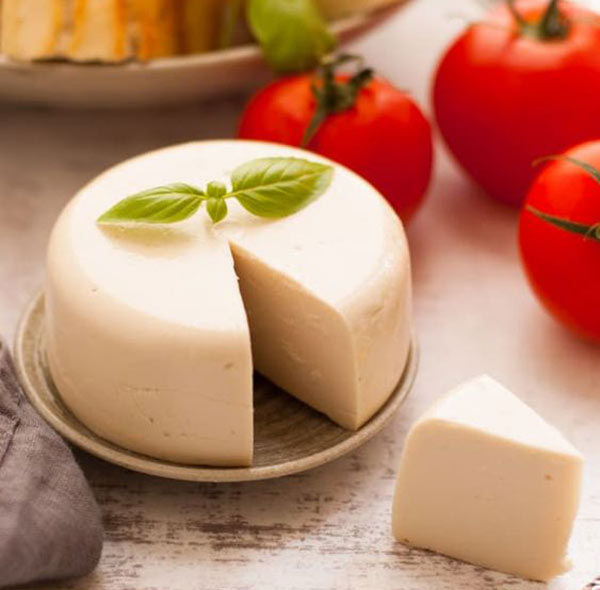Mozzarella cheese benefits for weight loss and cholesterol
Mozzarella cheese benefits
 Mozzarella cheese benefits for weight loss and cholesterol on Nicholi site. We hope this article will be of interest to you.
Mozzarella cheese benefits for weight loss and cholesterol on Nicholi site. We hope this article will be of interest to you.
Cheese can be a part of a healthy diet when consumed in moderation. It provides important nutrients like protein and calcium but can also be high in saturated fat, sodium, and calories. Choosing lower-fat options, controlling portion sizes, and considering overall dietary balance are key to incorporating cheese into a healthy eating plan.
Disadvantages of mozzarella cheese
While mozzarella cheese is a popular and widely enjoyed cheese, it does have a few disadvantages. Here are some potential drawbacks of mozzarella cheese:
High in calories: Mozzarella cheese is relatively high in calories compared to some other types of cheese. If consumed in large quantities or as part of a calorie-dense diet, it can contribute to weight gain.
High in saturated fat: Mozzarella cheese contains a significant amount of saturated fat. Consuming excessive amounts of saturated fat can increase the risk of cardiovascular diseases and raise cholesterol levels.
High in sodium: Mozzarella cheese is often salted during the production process, resulting in high sodium content. People who need to limit their sodium intake, such as those with high blood pressure or certain medical conditions, should be cautious with their consumption.
Lactose content: Mozzarella cheese contains lactose, a sugar found in milk. Individuals with lactose intolerance may experience digestive discomfort, such as bloating, gas, or diarrhea if they consume mozzarella cheese or other dairy products.
Limited nutritional profile: While mozzarella cheese is a good source of protein and calcium, it lacks many other essential nutrients. Relying solely on mozzarella cheese for nutrition may lead to nutrient deficiencies if it is not part of a balanced diet.
Short shelf life: Fresh mozzarella cheese has a relatively short shelf life compared to processed cheeses. It can spoil quickly, especially if not stored properly. This limited shelf life can be inconvenient for some consumers.
Potential allergenicity: Some individuals may be allergic to mozzarella cheese or other dairy products, experiencing symptoms such as skin rashes, swelling, or respiratory difficulties. Allergies can vary in severity, and it’s important to consult with a healthcare professional if you suspect an allergic reaction.
Is mozzarella cheese good for weight loss?
While mozzarella cheese can be part of a healthy diet, it is not specifically known as a weight-loss food. Mozzarella cheese is relatively high in calories and saturated fat, which means that consuming it in large quantities could hinder weight loss efforts. However, when consumed in moderation as part of a balanced diet, mozzarella cheese can provide important nutrients like protein and calcium.
When it comes to weight loss, it’s essential to consider portion sizes and overall calorie intake. It’s recommended to choose lower-fat versions of mozzarella cheese, such as part-skim or reduced-fat options, to reduce calorie and fat content. Additionally, incorporating mozzarella cheese into meals with plenty of vegetables, lean proteins, and whole grains can help create a more balanced and filling meal.
Remember, weight loss is a complex process that involves various factors, including overall calorie balance, physical activity, and individual preferences. Consulting with a registered dietitian or healthcare professional can provide personalized guidance tailored to your specific needs and goals.
Is mozzarella cheese good for cholesterol?
Mozzarella cheese, like many other dairy products, contains saturated fat, which has been associated with increased cholesterol levels when consumed in excess. High levels of LDL (low-density lipoprotein) cholesterol, often referred to as “bad” cholesterol, are linked to an increased risk of heart disease.
While mozzarella cheese does contain saturated fat, it also provides beneficial nutrients like protein and calcium. When consumed in moderation as part of a balanced diet, mozzarella cheese is unlikely to have a significant negative impact on cholesterol levels for most individuals.
It’s important to note that the overall dietary pattern and the consumption of other high-saturated-fat foods play a more significant role in cholesterol management than a single food item. If you have concerns about cholesterol levels or have been advised to limit your saturated fat intake, it’s best to consult with a healthcare professional or registered dietitian. They can provide personalized advice and help you develop a dietary plan that suits your specific needs.
Is mozzarella cheese fattening?
Mozzarella cheese is not inherently “fattening,” but it is relatively high in calories and saturated fat. Consuming mozzarella cheese in large quantities or as part of a high-calorie diet can contribute to weight gain over time.
The calorie content and fat content of mozzarella cheese can vary depending on the type and preparation. Traditional, full-fat mozzarella cheese tends to be higher in calories and saturated fat compared to reduced-fat or part-skim varieties.
To incorporate mozzarella cheese into a balanced diet without promoting weight gain, it is important to be mindful of portion sizes and consider the overall calorie intake. Opting for lower-fat versions of mozzarella cheese or using smaller amounts can help reduce calorie and fat intake while still enjoying its flavor and texture.
Remember that weight management is a complex process that involves various factors, including overall calorie balance, physical activity, and individual metabolism. It’s advisable to consult with a registered dietitian or healthcare professional who can provide personalized guidance based on your specific dietary needs and goals.
Is mozzarella cheese processed?
Mozzarella cheese can be classified as processed cheese, but the extent of processing can vary depending on the type of mozzarella and its production method.
Traditional mozzarella cheese, often referred to as “fresh mozzarella,” is made by using the natural enzymes found in fresh milk or through the addition of bacterial cultures. It undergoes minimal processing, typically involving the curdling of milk, shaping, and packaging. This type of mozzarella cheese is generally considered less processed compared to other varieties.
On the other hand, there are processed mozzarella cheeses available, which undergo additional steps to enhance shelf life, texture, and melting properties. These processed mozzarella cheeses may involve the use of emulsifiers, stabilizers, and preservatives. They are typically found in shredded or sliced forms and are often used for convenience in cooking or food preparation.
It’s worth noting that the term “processed” is not necessarily synonymous with “unhealthy.” While processed cheeses may have additives or undergo more extensive processing, they can still be part of a balanced diet when consumed in moderation.
If you prefer less processed options, you can look for fresh mozzarella made from simple ingredients or choose mozzarella cheeses that have a shorter ingredient list with recognizable components.
Is mozzarella cheese healthy for diabetics?
Mozzarella cheese can be a part of a healthy diet for individuals with diabetes, but it’s important to consider portion sizes and overall carbohydrate intake.
Mozzarella cheese is low in carbohydrates and contains protein, which can be beneficial for managing blood sugar levels. Protein has minimal impact on blood sugar compared to carbohydrates. Additionally, mozzarella cheese is a good source of calcium, which is important for overall bone health.
However, it’s crucial to keep in mind that mozzarella cheese does contain saturated fat. Individuals with diabetes should be mindful of their saturated fat intake, as high levels of saturated fat can negatively affect heart health and increase the risk of cardiovascular diseases.
When including mozzarella cheese in a diabetic meal plan, consider the following tips:
Watch portion sizes: Mozzarella cheese is calorie-dense, so it’s important to consume it in moderate amounts. Stick to appropriate portion sizes to avoid excessive calorie intake.
Choose lower-fat options: Opt for part-skim or reduced-fat mozzarella cheese varieties, as they have a lower saturated fat content compared to full-fat versions.
Balance your meal: Incorporate mozzarella cheese into a well-balanced meal that includes vegetables, lean proteins, and whole grains. This can help slow down the absorption of carbohydrates and provide a more balanced nutrient profile.
Consider the overall carbohydrate count: While mozzarella cheese itself has minimal carbohydrates, if you’re adding it to other dishes or consuming it with carbohydrate-rich foods, such as bread or pasta, be mindful of the total carbohydrate intake.
Is fresh mozzarella healthier than regular?
Fresh mozzarella and regular mozzarella cheese have some differences in terms of flavor, texture, and moisture content, but in terms of overall healthiness, they are quite similar. Here are a few considerations:
Fat content: Fresh mozzarella is typically made from whole milk, so it contains a higher fat content compared to regular mozzarella cheese. Regular mozzarella cheese can be made from whole milk, part-skim milk, or skim milk, resulting in varying levels of fat content. If you are concerned about fat intake, opting for part-skim or reduced-fat mozzarella cheese would be a lower-fat option.
Moisture content: Fresh mozzarella has a higher moisture content and a softer, creamier texture compared to regular mozzarella. Regular mozzarella cheese tends to be firmer and less moist. The moisture content does not significantly impact the nutritional value of the cheese but can affect its culinary uses and personal preferences.
Nutritional profile: The nutritional composition of fresh mozzarella and regular mozzarella cheese is quite similar. Both types provide protein, calcium, and other essential nutrients. However, it’s important to note that the overall nutritional profile of mozzarella cheese, regardless of the type, includes saturated fat and sodium. Moderation and mindful portion control are key to a healthy diet.
When it comes to healthiness, choosing the right type of mozzarella cheese depends on individual dietary preferences, nutritional goals, and health considerations. If you are aiming to reduce fat content, opting for lower-fat versions like part-skim mozzarella may be a suitable choice. However, the overall healthiness of mozzarella cheese relies on consuming it as part of a well-balanced diet and considering portion sizes.
Is cheese healthy?
Cheese can be a part of a healthy diet when consumed in moderation and as part of a balanced overall eating pattern. Here are some factors to consider when evaluating the healthiness of cheese:
Nutrient Content: Cheese is a good source of essential nutrients such as protein, calcium, phosphorus, vitamin B12, and zinc. These nutrients play important roles in bone health, muscle function, and overall well-being.
Protein: Cheese is a source of high-quality protein, which is important for building and repairing tissues, as well as supporting various bodily functions.
Calcium: Cheese is rich in calcium, which is crucial for healthy bones and teeth. Adequate calcium intake is particularly important for bone health, especially as people age.
Fats: Cheese contains varying amounts of fat, including saturated fat. While some types of cheese are higher in saturated fat, others, such as low-fat or reduced-fat options, contain less. It’s generally recommended to choose lower-fat varieties and consume cheese in moderation to manage overall fat and saturated fat intake.
Sodium: Some cheeses can be relatively high in sodium, which may be a concern for individuals with high blood pressure or certain medical conditions. It’s important to read food labels and choose lower-sodium options when available.
Calorie Density: Cheese is calorie-dense due to its fat content. This means that consuming large quantities of cheese can contribute to calorie intake, potentially leading to weight gain if not accounted for in overall energy balance.





















